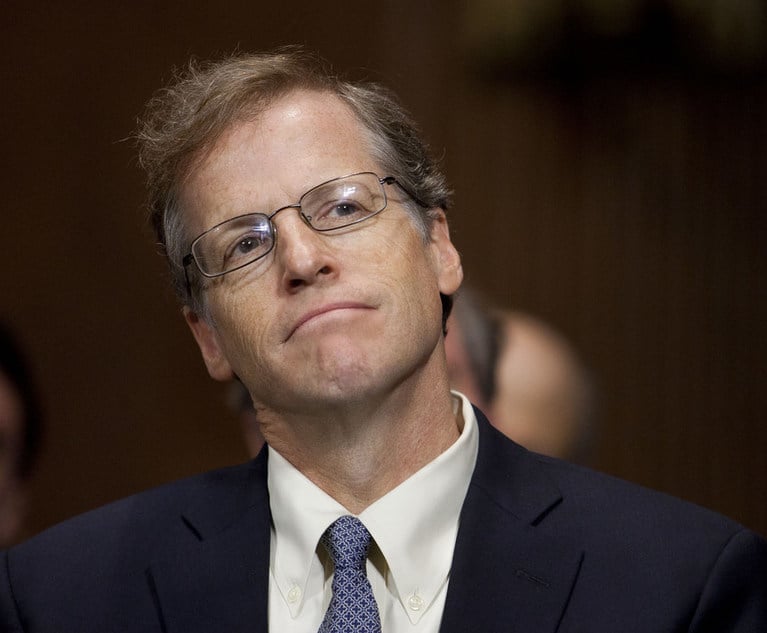Beware the Risks of Corporate Service
Board service comes with some potential risks that, if not adequately addressed, can result in severe consequences for the attorney, the attorney's firm, and/or the organization.
February 01, 2018 at 01:13 PM
6 minute read

Attorneys can be eager to serve on boards of directors of outside organizations and with good reason. After all, membership on a board can increase the attorney's visibility, create connections that lead to new business and, in the case of nonprofit organizations, help the attorney give back to the community. For younger attorneys, service on a board can also provide invaluable “real-life” business experience. However, board service comes with some potential risks that, if not adequately addressed, can result in severe consequences for the attorney, the attorney's firm, and/or the organization.
Potential Issues
Although attorneys serving on boards generally are asked only to act as board members, it can be difficult sometimes for attorneys to resist acting like an attorney. For example, the attorney may want to express legal opinions regarding a particular course of action under consideration. Sometimes, the board itself muddies the lines by soliciting the attorney's opinion as to the legality of the organization's actions, notwithstanding the attorney's nonlegal role.
As a result, it can often be ambiguous regarding whether the attorney is providing legal services to the organization in the context of an attorney-client relationship or whether the attorney is simply acting in her or his capacity as a board member. This confusion can lead to problems. For example, other board members may erroneously believe that communications with the attorney are protected by the attorney-client privilege, even though the organization and the board members may not be the attorney's clients.
Another concern when the attorney's role is not well-defined is the potential effect on the insurance coverage available to the attorney. Board members can face a wide variety of potential claims, and the risk for a claim can be heightened if the attorney board member is perceived as rendering legal advice to the organization regarding a course of action. In such circumstances, the organization's directors and officers liability insurance carrier may argue that coverage is unavailable for any subsequent claim because the attorney was acting in her or his capacity as an attorney, while the attorney's professional liability insurer may conversely argue that coverage is precluded due to the attorney's role in the organization. As a result, the attorney could be caught in the middle of a coverage dispute.
Additionally, ambiguity regarding whether there is an attorney-client relationship between the attorney and the organization can give rise to an argument that the attorney's service creates conflicts of interest for the attorney's law firm.
In the event that the attorney is being retained to provide legal services to the board, the firm may have to examine whether such conduct is appropriate within the confines of its policies, procedures, and conflicts — and insurance coverage.
Limiting Risk
Despite these various risks, there are a number of steps that law firms can take to ensure that the attorney and the law firm are protected while enjoying the benefits of the attorney's nonlegal service on outside boards.
For example, law firms may consider enacting a written policy governing service on outside boards. This policy can vary depending on whether the entity is for-profit or nonprofit, or where the organization is a client of the firm.
Many firms will also take stock of how many attorneys serve on outside boards. In fact, some applications for professional liability insurance will ask firms to confirm how many attorneys serve on outside boards. Firms can remind attorneys of the necessity of full and complete answers to any questions that relate to insurance coverage that may be purchased or obtained.
The law firm also may consider requiring that the attorney obtain firm approval before agreeing to any board service, reserving the right to revoke approval. This allows the firm to evaluate the pros and cons of the attorney's service on the board and to re-evaluate the relationship in the event that circumstances change. Most firms will also record the attorney's relationship with the organization in the firm's conflicts clearance database to avoid any potential conflicts with current or future clients.
Next, the law firm may consider requiring that the attorney confirm the following with the organization, as applicable:
• The attorney will act solely in a business capacity;
• No attorney-client relationship exists between the law firm and the organization; and
• No communications with the attorney will be protected by the attorney-client privilege.
Confirming the scope of the relationship with the organization up front will help avoid any ambiguity that could lead to negative consequences later. Likewise, in the event that legal issues arise, the attorney may again remind other board members that the attorney is acting solely in a business capacity and recommend that the organization retain outside counsel, where practicable.
It may also be helpful for the law firm to remind the attorney that the law firm's professional liability insurance may not cover claims arising out of the attorney's service on the board. Instead, the attorney may choose to confirm that the organization has adequate directors and officers insurance and appropriate indemnification provisions for board members.
Finally, the law firm may consider prohibiting or requiring advance approval of the use of the firm's name or logo in the organization's marketing, public relations, or external literature. While it may be standard to identify the board member's association with the law firm in, for example, a biography on the organization's website, the firm may consider whether any other reference to the law firm could create the impression that the law firm endorses the viewpoints of the organization.
By following these suggested steps, a law firm can minimize the risk associated with an attorney's service on outside boards.
Shari L. Klevens is a partner at Dentons US in Atlanta and Washington and serves on the firm's U.S. board of directors. She represents and advises lawyers and insurers on complex claims and is co-chairwoman of Dentons' global insurance sector team.
Alanna Clair is a senior managing associate at Dentons US in Washington and focuses on professional liability defense. Klevens and Clair are co-authors of “The Lawyer's Handbook: Ethics Compliance and Claim Avoidance.”
This content has been archived. It is available through our partners, LexisNexis® and Bloomberg Law.
To view this content, please continue to their sites.
Not a Lexis Subscriber?
Subscribe Now
Not a Bloomberg Law Subscriber?
Subscribe Now
NOT FOR REPRINT
© 2025 ALM Global, LLC, All Rights Reserved. Request academic re-use from www.copyright.com. All other uses, submit a request to [email protected]. For more information visit Asset & Logo Licensing.
You Might Like
View All
35 Years After CT's Affordable Housing Act, Progress Remains a Struggle
4 minute read

Trending Stories
- 1LexisNexis Announces Public Availability of Personalized AI Assistant Protégé
- 2Some Thoughts on What It Takes to Connect With Millennial Jurors
- 3Artificial Wisdom or Automated Folly? Practical Considerations for Arbitration Practitioners to Address the AI Conundrum
- 4The New Global M&A Kings All Have Something in Common
- 5Big Law Aims to Make DEI Less Divisive in Trump's Second Term
Who Got The Work
J. Brugh Lower of Gibbons has entered an appearance for industrial equipment supplier Devco Corporation in a pending trademark infringement lawsuit. The suit, accusing the defendant of selling knock-off Graco products, was filed Dec. 18 in New Jersey District Court by Rivkin Radler on behalf of Graco Inc. and Graco Minnesota. The case, assigned to U.S. District Judge Zahid N. Quraishi, is 3:24-cv-11294, Graco Inc. et al v. Devco Corporation.
Who Got The Work
Rebecca Maller-Stein and Kent A. Yalowitz of Arnold & Porter Kaye Scholer have entered their appearances for Hanaco Venture Capital and its executives, Lior Prosor and David Frankel, in a pending securities lawsuit. The action, filed on Dec. 24 in New York Southern District Court by Zell, Aron & Co. on behalf of Goldeneye Advisors, accuses the defendants of negligently and fraudulently managing the plaintiff's $1 million investment. The case, assigned to U.S. District Judge Vernon S. Broderick, is 1:24-cv-09918, Goldeneye Advisors, LLC v. Hanaco Venture Capital, Ltd. et al.
Who Got The Work
Attorneys from A&O Shearman has stepped in as defense counsel for Toronto-Dominion Bank and other defendants in a pending securities class action. The suit, filed Dec. 11 in New York Southern District Court by Bleichmar Fonti & Auld, accuses the defendants of concealing the bank's 'pervasive' deficiencies in regards to its compliance with the Bank Secrecy Act and the quality of its anti-money laundering controls. The case, assigned to U.S. District Judge Arun Subramanian, is 1:24-cv-09445, Gonzalez v. The Toronto-Dominion Bank et al.
Who Got The Work
Crown Castle International, a Pennsylvania company providing shared communications infrastructure, has turned to Luke D. Wolf of Gordon Rees Scully Mansukhani to fend off a pending breach-of-contract lawsuit. The court action, filed Nov. 25 in Michigan Eastern District Court by Hooper Hathaway PC on behalf of The Town Residences LLC, accuses Crown Castle of failing to transfer approximately $30,000 in utility payments from T-Mobile in breach of a roof-top lease and assignment agreement. The case, assigned to U.S. District Judge Susan K. Declercq, is 2:24-cv-13131, The Town Residences LLC v. T-Mobile US, Inc. et al.
Who Got The Work
Wilfred P. Coronato and Daniel M. Schwartz of McCarter & English have stepped in as defense counsel to Electrolux Home Products Inc. in a pending product liability lawsuit. The court action, filed Nov. 26 in New York Eastern District Court by Poulos Lopiccolo PC and Nagel Rice LLP on behalf of David Stern, alleges that the defendant's refrigerators’ drawers and shelving repeatedly break and fall apart within months after purchase. The case, assigned to U.S. District Judge Joan M. Azrack, is 2:24-cv-08204, Stern v. Electrolux Home Products, Inc.
Featured Firms
Law Offices of Gary Martin Hays & Associates, P.C.
(470) 294-1674
Law Offices of Mark E. Salomone
(857) 444-6468
Smith & Hassler
(713) 739-1250











